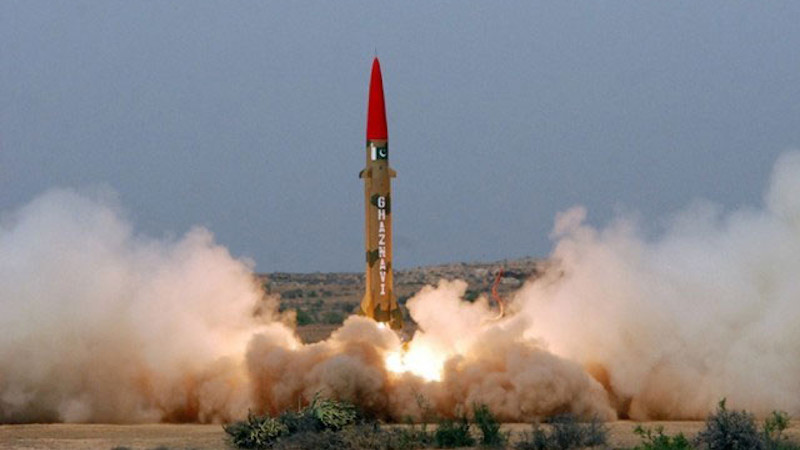Guardians Of The Atom – OpEd

One cannot even imagine nuclear safety in the contemporary globalized economy, let alone these nations, which are already involved in conflicts. South Asia most often appeared in anxiety structure in connection with nuclear reliability and stability since two state- participants of the Treaty on the Non-Proliferation of nuclear weapons, which possess nuclear weapon – India and Pakistan are situated in South Asia region. Despite of the fact that both the countries have seen fairly remarkable progress in nuclear technology, there are few reasons that suggest that Pakistani nukes are safer and more secure than Indians.
Pakistan started the nuclear programme with the intention of responding to India after the latter of declared its nuclear status after its nuclear test in 1974 famously know as ‘Smiling Buddha’. In early seventies Pakistan under the leadership of PM Zulfikar Ali Bhutto initiated the nuclear programme and the main aim was to acquire nuclear weapons. Over the past decades Pakistan has developed nuclear command and control that increases safety and security of stocks of nuclear weapons. This ranges from prohibition of delivery and use by any other person/organization other than the official user who is under the National Command Authority (NCA) and it comes with a comprehensive policy on nuclear weapon.
Command and control are one among the major elements of the security for nuclear assets. Thus, the hierarchical commanding controlling structure of Pakistan’s sports is centralized and very much secure. The NCA was established in the year 2000 and it has the mantle to coordinate and oversee all the nuclear activities which covers formulation of nuclear policies, acquisition, employment and any other matter regarding nuclear. The NCA is placed right under the Prime Minister, and the membership also includes both military and civilians; to improve the quality of decisions made.
Another inhibition hinged on the fact that India’s command and control structure has been criticized for being decentralized as well as non-specific to what it wishes to achieve. India's Nuclear Command Authority (NCA) is divided into two distinct branches: the second of this one is the Political Council which consist of the Prime Minister and the third one is the Executive Council which consist of the National Security Advisor. It indeed has a negative aspect in a critical situation because when the task and power of decision making is divided, it can create problems and confusion.
Due to development of so many sophisticated physical security systems, safeguarding of both conventional and nuclear weapons in Pakistan has been improved a lot. The SPD engages other worldwide organizations and adheres to the international standards to give the optimal nuclear safety levels. India, however, has had issues in attaining nuclear security as a safeguard of nuclear assets. The nuclear locations including power stations have also not remained safe and there were occasions where power stations leaked, and security been breached. For instance, it was also detected in the year 2014 that a Kudankulam nuclear power plant ex-employee was in touch with the extreme outfits. This and similar events serve as good examples of links that can be easily broken in the system of nuclear security of India and prove the need for increasing the level of security.
Pakistan has well formulated rules and regulations that emerge due to the existence of the Pakistan Nuclear Regulatory Authority (PNRA) that regulates the nuclear power in the country. For this purpose, the PNRA is in close cooperation with the IAEA to apply the relevant standard in safety thus having an exclusive control over the nuclear activities. Overall, it can be concluded that Pakistan has been serious about international cooperation and does follow the norms of international relations and laws: has been transparently informed to the IAEA, participates in the Nuclear Security Summit, and so on. India also has been criticized for its non-transparency and its lack of entailment in the international non-proliferation regimes. India still has not joined the NPT as well as the CTBT which have raised eyebrows of many on the intention of India on nuclear issue, safety and non-proliferation. India has attempted to improve the regulation of its financial services, but it is noticed that issues persist most particularly with regard to the global market and thus coordination.
As for the crisis management, it can be also stated that in recent years enhanced activity was observed in terms of Pakistan’s efforts to enhance its capacities for managing the crises. Thus, due to the presence of the nuclear squabble, the SPD keeps performing the scenarios and acting in regard to the contingency, including the agencies. To avoid these major incidences such as the nuclear accident or mishaps, the government of Pakistan has made sure to put measures in place on preparedness. India has unfortunately been on the receiving end in terms of count and dealing with crises in the past.
Thus, the Pakistan is more secured nuclear state than India despite the fact that both countries have advanced their nuclear realms in terms of the development and security because of the effective and high centralized command and control system, strict secured measures, formal legal structure and framework, and active contingencies management procedures and policies. The eagerness to reply to demands by other nations and the possibility to adhere to the global safety plans highlight Pakistan’s dedication to the nuclear safety as well. Due to the problems persisting in various countries of the world about the safety of nuclear power, it becomes the issue for both countries to bolster their future for the protection related to nuclear energy and to advance hand in hand for a safer and progressive South Asian area.
